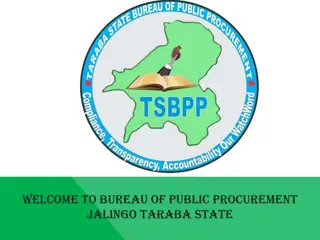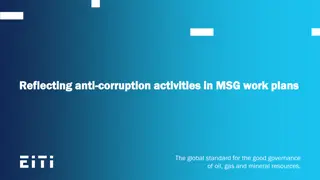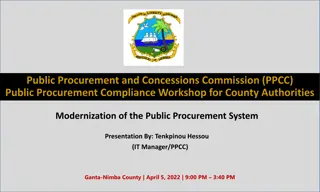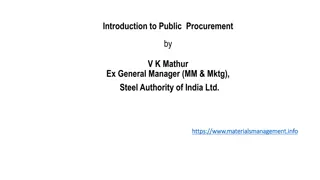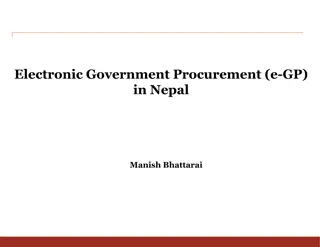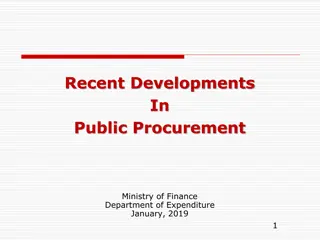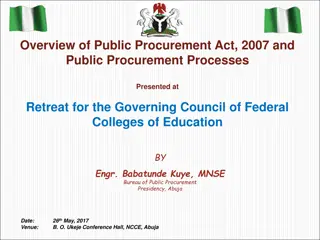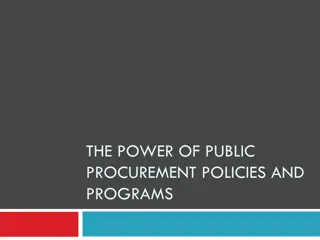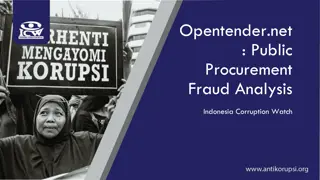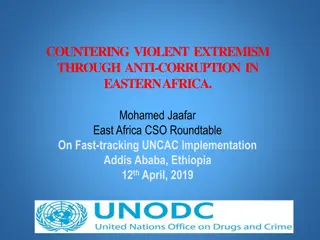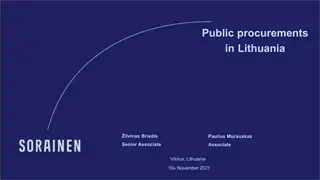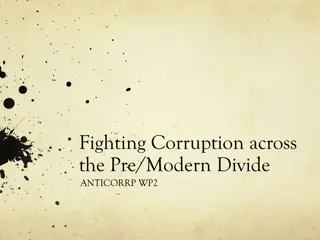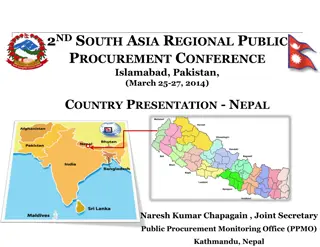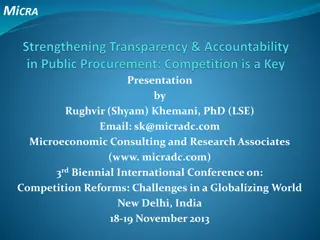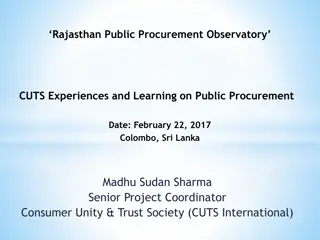Comprehensive Overview of Corruption Watch Submission on Public Procurement Bill [B18B-2023]
Corruption Watch, a civil society organization, presents a detailed submission on the Public Procurement Bill [B18B-2023], highlighting key areas such as legislative reform, public participation, preferential procurement, transparency measures, independence of procurement entities, anti-corruption mechanisms, and incentivized whistleblowing. The submission underscores the importance of embedding policy principles into primary legislation to enhance fairness, transparency, and efficiency in the public procurement sector.
- Corruption Watch
- Public Procurement Bill
- Legislative Reform
- Transparency Measures
- Anti-Corruption Mechanisms
Download Presentation

Please find below an Image/Link to download the presentation.
The content on the website is provided AS IS for your information and personal use only. It may not be sold, licensed, or shared on other websites without obtaining consent from the author. Download presentation by click this link. If you encounter any issues during the download, it is possible that the publisher has removed the file from their server.
E N D
Presentation Transcript
CORRUPTION WATCH SUBMISSION PUBLIC PROCUREMENT BILL [B18B-2023] Presented by: Motlatsi Komote
PRESENTATION OUTLINE INTRODUCTION LEGISLATIVE REFORM AND OBJECTIVES OF B18B-2023 PUBLIC PARTICIPATION PREFERENTIAL PROCUREMENT TRANSPARENCY MEASURES INDEPENDENCE OF THE PPO AND PPT ANTI-CORRUPTION MECHANISMS INCENTIVISED WHISTLEBLOWING RECOMMENDATIONS
CORRUPTION WATCH IS A CIVIL SOCIETY ORGANISATION THAT WAS ESTABLISHED IN 2012 AND IS THE SOUTH AFRICAN CHAPTER OF TRANSPARENCY INTERNATIONAL. OUR MANDATE IS TO UNDERTAKE COUNTER-CORRUPT ACTIVITIES IN BOTH THE PUBLIC AND PRIVATE SECTOR WITH THE VIEW OF PROTECTING PUBLIC RESOURCES.
LEGISLATIVE REFORM AND OBJECTIVES OF B18B-2023
Section 217(c) of the Constitution lays down an imperative of a public procurement system that is fair, equitable, transparent, competitive and cost-effective. LEGISLATIVE REFORM AND OBJECTIVES Policy principles of this nature ought to be embedded into primary legislation as opposed to merely incorporating them into subordinate legislation. These principles are crucial to addressing the fragementation within the public procurement sector. Section 217 provides a guideline on this. Lawmakers must embed the policy principles into subordinate legislation. A failure to do so carries a risk of vesting too much discretion with the relevant Minister on procurement methods available without offering guiding principles in the Bill.
PUBLIC PARTICIPATION Various CSOs Had Made Contributions To The Bill In The Na Process And It Appeared That Our Submission, Like That Of Many Others Was Not Considered. The NA abrogated its responsibilities to the OCPO which responded to only 36% of the inputs made. Facilitating public involvement means giving members of the public a reasonable opportunity capable of influencing the decision to be taken. There were substantial changes made by the OCPO to Chapter Four which had an impact on public participation. It would therefore be appropriate to refer the changes back to the National Economic Development and Labour Council (NEDLAC).
A lack of full engagement by the public on Chapter Four during the NA process which hinders meaningful public participation. We note with concern the removal of price as a criteria for evaluating tenders. This misaligns the Bill with section 217 of the Constitution. Public procurement must be equitable, competitive, transparent and cost-effective. We call for the reinstatement of price as criteria within the Bill. PREFERENTIAL PROCUREMENT CONCERNS
TRANSPARENCY MEASURES TRANSPARENCY, ACCOUNTABILITY MECHANISMS IN THE BILL SHOULD BE STRENGTHENED - SUCH AS REQUIRING POLICY TRANSPARENCY AND OPEN DATA FOR THE FULL PROCUREMENT LIFE CYCLE.
INDEPENDENCE OF THE PPO AND PPT Public Procurement Office (PPO): A PPO separate from National Treasury and accountable to Parliament could enhance professionalism in procurement, ensure fairness, efficiency, legal compliance and strengthen checks and balances and prevent political interference. Provincial Treasuries: Empower provincial treasuries to issue instructions and oversee procurement but clarify decision precedence for better coordination. Public Procurement Tribunal: Appointment procedures lack separation of powers; CW suggestS the establishment of an appointment committee. Advocate for transparent shortlisting and appointment processes, specifying minimum Tribunal members for accountability. Review decision-making mechanisms to ensure fairness and accountability. Strengthen disclosure of interest requirements and qualifications of Tribunal members. Propose a voting process that includes a quorum and clarification on panel proceedings and finances to ensure sufficient resourcing.
ANTI-CORRUPTION MECHANISMS DEBARMENT Short timeframes for informing bidders of the decision to debar are impracticable and should be increased from 10 to 15 working days. INFORMATION DISCLOSURE CW cautions against a reliance by the PPO on PAIA as the method for accessing this information.
It is important to consider repeated calls by formations at NEDLAC and various CSOs for the inclusion of incentivized whistleblowing in the Bill. Not doing so, would be an injustice to the current whistleblower environment. The benefits of incentivized whistleblowing include: Early detection and prevent of fraud, corruption and bid rigging particularly at a provincial and local government level. Incentivised whistleblowing has been incorporated in various jurisdictions and South Africa should ideally follow suit. INCENTIVISED WHISTLEBLOWING
RECOMMENDATIONS CW recommends that the Committee incorporate incentivized whistleblowing in the final version of the Bill. Transparency, accountability mechanisms in the Bill should be strengthened. Separation of powers between the various entities (National Treasury, PPO, provincial treasuries) must be reinforced for clarity and efficiency purposes. Meaningful public participation must be considered throughout the legislative process in the NCOP. Progress made in receiving public input should not be lost.




